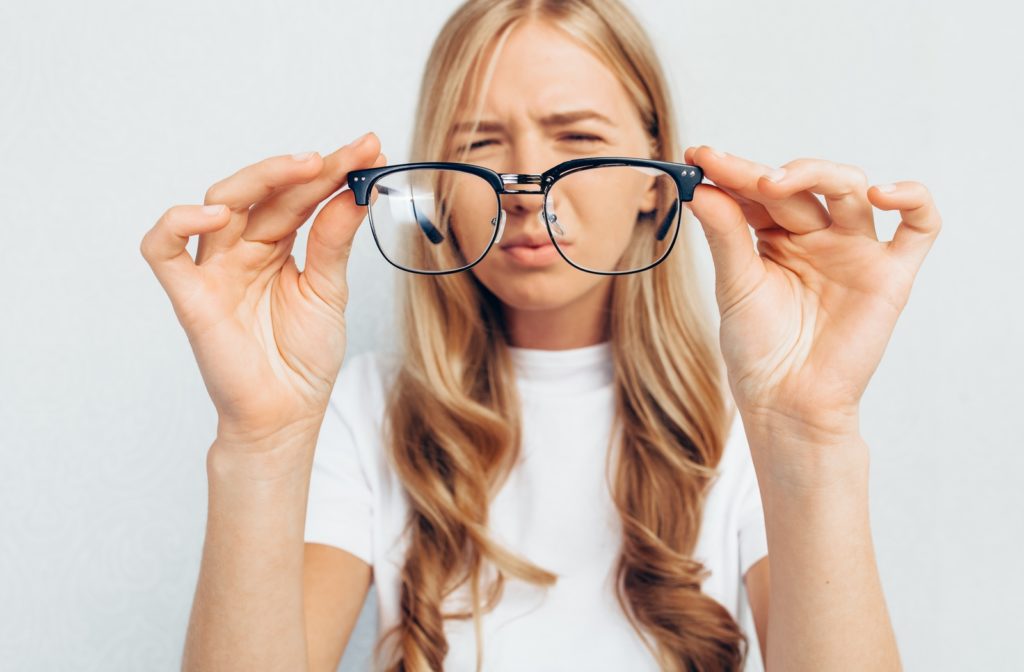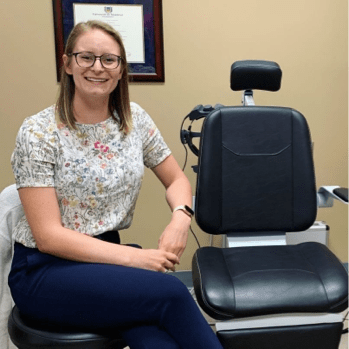Your glasses provide you with improved vision whenever you wear them. Your optometrist determines the best prescription for your needs, but can your glasses make your eyesight worse?
Continue reading to learn more about how glasses affect your vision, including if they can worsen your eyesight.
The Importance of Your Glasses
Your glasses can help you see better, but what do they do?
Glasses allow you to see clearly and comfortably, correcting refractive errors that force your eyes to work harder. Without glasses, your vision may worsen. In the case of myopia, under-correcting this condition can cause it to progress further.
With many Canadians requiring vision correction, glasses are essential for helping people see clearly. According to Statistics Canada, approximately 30% of young Canadians and over 50% of adults 40 to 60 years old need some type of vision correction.
Your glasses can’t shorten the length of your eyeball if you have myopia, but they can help alter the way incoming light bends, improving your vision. Glasses can correct vision problems, but can they make your eyesight worse?
Can Your Glasses Make Your Eyesight Worse?
In short, your glasses won’t make your eyesight worse—they’re essential for correcting refractive errors and providing clearer vision! When you take your glasses off after wearing them for long periods, you may think your vision is worse than it was, but this is a result of comparing uncorrected vision to corrected vision.
In fact, not wearing your glasses will hinder your vision more, causing refractive error symptoms to develop, such as:
- Double vision
- Hazy vision
- Glare & halos
- Squinting
- Headaches
- Eyestrain
- Trouble focusing
If your glasses aren’t holding up like they used to, you may wonder if they’re hindering your vision more than helping. Your glasses aren’t making your eyesight worse—your vision might be naturally changing.
While your glasses don’t worsen your eyesight, your vision can change as you age, and your old prescription might not work as well. Close-up vision can become more difficult after age 40 due to presbyopia, for example. This is why many adults develop the need for reading glasses.
Vision Changes With Age
Changes happen to your eyes as you age. Your prescriptions might have frequently changed in childhood, but this happens slower for adults. Age-related changes can affect your vision and eye health.
Many older adults develop eye conditions affecting their vision, like cataracts. If your eyesight feels worse when wearing your glasses, it might mean natural changes to your vision.
These vision changes happen regardless of whether you regularly wear your glasses or not. Your glasses can help you continue to see well as your vision changes.
Strained Eyes
If your eyes feel strained when using your glasses, you may have an underlying condition. Another possibility is that your glasses prescription may have changed. An outdated prescription can lead to headaches, eyestrain, and blurry vision.

Your Prescription May Have Changed
Another possibility if your eyesight feels worse is that your prescription is different. An outdated prescription can irritate your eyes and lead to several annoying symptoms.
Natural vision changes may mean you need an updated prescription. This is why it’s so important that children get an eye exam once per year and adults get an eye exam at least every 2 years. Regular eye exams allow your optometrist to measure changes in your vision, and recommend new glasses if needed.
A sign of an outdated prescription is consistent blurry vision. Other signs include:
- Strained eyes
- Headaches
- Neck pain
- Dizziness
- Double vision
- Irritated or burning eyes
Strained eyes happen because they need to work harder to see images through your glasses, making the correct glasses prescription that much more important.
Can an Outdated Prescription Damage Your Vision?
An old prescription can strain your eyes, leading to headaches and irritation, but your glasses won’t damage your vision. A visit to your optometrist can help diagnose whether or not your prescription has changed or if another condition is affecting your vision. Whether it’s a new prescription or treatment for an underlying condition, your eye doctor can help.
Comprehensive Eye Exams Can Help Assess Your Vision
While your eye doctor can assess your vision during an eye exam, they do many other tests to evaluate your eye health. They can test for different diseases and examine your eye’s structures to identify any problems.
Examining your eyes can help your optometrist diagnose conditions such as:
Your eye doctor can determine the reason for your worsened eyesight after completing your examination. Depending on test results, they may recommend a treatment plan to address any present issues, or they can write you an updated prescription. Regular eye exams can help identify further changes to your vision in the future.
How Often Should You See Your Optometrist?
The Canadian Association of Optometrists recommends adults aged 20 to 39 get an eye exam at least every 3 years. After 40, you should see your eye doctor every 2 years, while older adults past 65 should have an annual examination.
Some conditions, like diabetes, may require you to see your optometrist more regularly. To protect your eye health and vision, follow your eye doctor’s recommendations on how often your examinations should be.
Don’t Settle for Poor Vision
Your glasses can’t worsen your eyesight, but you may have another present issue. Whether it’s a changed prescription or an eye condition, visit your optometrist if you’re having visual problems.




